|
|
|
Sort Order |
|
|
|
Items / Page
|
|
|
|
|
|
|
| Srl | Item |
| 1 |
ID:
099095
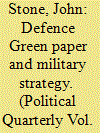

|
|
|
| 2 |
ID:
099088
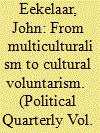

|
|
|
|
|
| Publication |
2010.
|
| Summary/Abstract |
In the context of the current debate on multiculturalism, this article draws on three models of state policies towards families to propose a reframing of multiculturalist policies. They are the 'authorisation' model, wherein the state authorises families to define and enforce family obligations as law; the 'delegation' model, wherein the state prescribes the norms families are to follow and delegates to families the role of enforcing them; and the 'purposive abstention' model, wherein the state uses the voluntary performance family norms as a tool of policy, giving them limited legal recognition within the continued application of the general law. The article considers how these models might guide policy towards communities, which can be seen, substantially, as collections of families. It favours the 'purposive abstention' model, which, in the context of cultural groups, could be termed 'cultural voluntarism'.
|
|
|
|
|
|
|
|
|
|
|
|
|
|
|
|
| 3 |
ID:
099085
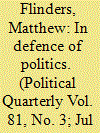

|
|
|
|
|
| Publication |
2010.
|
| Summary/Abstract |
In this, my inaugural lecture, I wanted to sing out in praise of politics! This seemed such a good idea twelve months ago, but now in the wake of even more stories about MPs not declaring foreign trips and former ministers demanding 'cash for access' the idea of trying to defend politicians and praise politics suddenly seems like a very bad idea. And yet it is exactly because politics is held in such low esteem that the lecture is so important. Democratic politics matters because it achieves far more than we generally give it credit for. I want to rediscover the essence and arguments of Bernard Crick's classic book In Defence of Politics because its arguments are more appropriate today than when they were first published in 1962.
|
|
|
|
|
|
|
|
|
|
|
|
|
|
|
|
| 4 |
ID:
099089


|
|
|
|
|
| Publication |
2010.
|
| Summary/Abstract |
Party names have been collected since 'Whig' and 'Tory' meant 'Scotch rebel' and 'Irish bandit'. 'Conservative' began as a catch-all on the right when one did not use the word 'right' in politics, struggled with 'Unionist' until Ireland got away and was a euphemism for 'Tory' before the Americans used it to describe howling extremists. 'Labour' meant skilled men in best suits and school teachers with elbow patches, and now has the resonance of Nineveh and Tyre.
|
|
|
|
|
|
|
|
|
|
|
|
|
|
|
|
| 5 |
ID:
099087
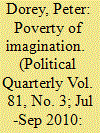

|
|
|
|
|
| Publication |
2010.
|
| Summary/Abstract |
Inequality in Britain today is now so deep that the top 10 per cent own 100 times more than the bottom 10 per cent, yet there is remarkably little public concern or anger about poverty. Indeed, compassion and concern for the poorest in society has actually declined in recent years due to the continued, and even increased, prevalence of the view that poverty is largely caused by laziness and lack of willpower, or is simply an unavoidable fact of modern life. Either way, many people tacitly accept that 'the poor will always be with us'. Moreover, much of the British public believes that there are sufficient opportunities to succeed for those who try hard enough, and also that it is the middle class which actually struggles the most, economically or financially. These assumptions are highly conservative in their ideological and political implications because they limit public support for egalitarianism and extensive wealth redistribution from rich to poor.
|
|
|
|
|
|
|
|
|
|
|
|
|
|
|
|
| 6 |
ID:
099090
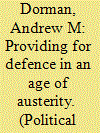

|
|
|
| 7 |
ID:
099099


|
|
|
|
|
| Publication |
2010.
|
| Summary/Abstract |
The Conservative-Liberal Democrat coalition government has committed itself to a Strategic Defence and Security Review (SDR) in 2010. The government and the country face very hard choices to bring United Kingdom defence and security policy back from the brink of bankruptcy-both financial and strategic (Gow). To succeed, it must overcome the failings of the past (Chisnall, Dorman, Rees) and take a truly open and radical look at all aspects of policy and process-including the Trident independent nuclear deterrent (Allen), relations with Europe (Witney) and the importance of cyber-issues in the future security context (Fisher). It must get strategic concepts right to provide flexibility with credibility (Stone). It must deliver 'what the military wants': true strategic prioritisation, radical defence acquisition reform, and credible balancing of resources and commitments (Kiszley). The scale of the challenge facing the United Kingdom in-and beyond-the 2010 SDR is why The Political Quarterly convened a workshop early in 2010 involving MPs, practitioners, retired military personnel, journalists, commentators, business people and academics, and publishes these associated papers. Most of all, to overcome the failings of the past, there must be a radical move beyond the welcome first steps of the Cameron-Clegg government to introduce a National Security Council and a National Security Advisor, to reconfigure relationships within government, across departments and with Parliament to have a government figure of accountability and responsibility-a Secretary of State for Security Policy, primus inter pares with other Secretaries of State-to make sense of the questions needing to be asked and answered (Gearson and Gow).
|
|
|
|
|
|
|
|
|
|
|
|
|
|
|
|
| 8 |
ID:
099092
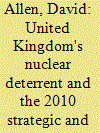

|
|
|
| 9 |
ID:
099076


|
|
|
|
|
| Publication |
2010.
|
| Summary/Abstract |
After the expenses scandal, it is time to ask what Members of Parliament are for. The traditional formal arguments are inadequate as they fail to engage with what MPs actually do. A typology is useful in illuminating the different ways in which MPs see their role: as Lickspittles, Loyalists, Localists, Legislators, Loners and Loose Cannons. Current trends in the performance of these roles can be identified, raising questions about the nature of politics and the vitality of Parliament.
|
|
|
|
|
|
|
|
|
|
|
|
|
|
|
|
| 10 |
ID:
099086


|
|
|
|
|
| Publication |
2010.
|
| Summary/Abstract |
The new Parliament will be asked at some point to make critical decisions about the BBC's future at a time when it is facing full-frontal assaults from competitors who view the BBC as a major barrier to their own advancement. Whether it be newspaper groups seeking to monetise their online activities, commercial children's channels, terrestrial competitors or the owners of music radio stations, media conglomerates rail against the BBC's size and public funding with increasing regularity. Our aim is to remind our legislators of the vital contribution this institution makes to British life: from a journalism inscribed with values of fairness, integrity and impartiality-and valued throughout the world for its professional engagement with foreign affairs-to its creative commitment to British story-telling, music, comedy, arts and children's programmes, the BBC's contribution to our democratic and cultural welfare is immense. It is a beacon for Britain, which provides social glue for its citizens at a time of fragmenting audiences and identities, within a uniquely non-commercial space, accountable to both Parliament and its licence payers. It may distort the market, much as the National Health Service distorts the market for health care, but is held in high esteem by the British public and is admired throughout the world. This article explains why the BBC is a national treasure that underpins our creative economy as well as our cultural vitality, and argues that it must be protected from those who argue self-interestedly for its diminution.
|
|
|
|
|
|
|
|
|
|
|
|
|
|
|
|
|
|
|
|
|